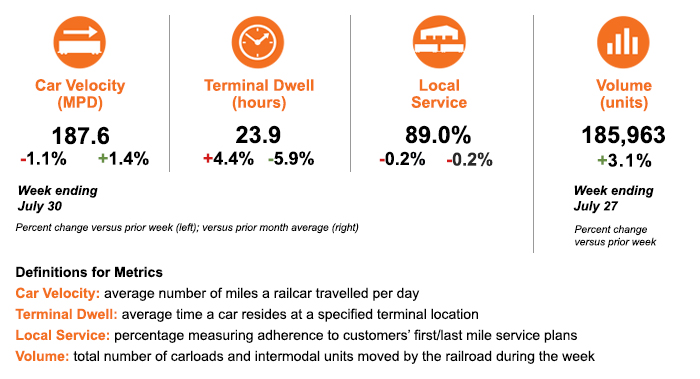Automotive Network Update for Friday, August 2, 2024
OPERATIONAL PERFORMANCE
BNSF responded to significant weather-related service challenges that impacted normal train flows on our busy Southern Transcon route between Southern California and the Midwest during the past week. Our operations teams confronted extreme heat and wind disruptions on the central part of the Transcon, from North Texas across the Central Plains. High winds with gusts of around 75 miles per hour caused reduced velocity, with speed restrictions in some areas. BNSF’s wind mitigation procedures helped to reduce some of the delays caused by these extreme winds. Current mitigation efforts include wind fences in strategic locations across the network and utilizing AI wind collection data applications to better predict potential impacts and find solutions to continue to minimize impacts caused by high winds on the network. A power outage near our Lincoln terminal in Nebraska on Wednesday afternoon, caused by storm activity in the area, impacted some merchandise traffic moving through the region. Despite this challenge, BNSF operating teams maintained good fluidity across our Northern Corridor this week.
Regarding key service metrics, average car velocity, while slightly lower than last week, has improved from last month. Terminal dwell, while elevated from last week, has improved significantly from June. Our local service compliance measure remains steady with last week and month.

NEW CAPACITY & EFFICIENCY PROJECT NOW IN SERVICE IN NEW MEXICO
Last weekend, BNSF crews placed into service two new processing tracks as part of a multi-year mainline improvement project in Becker, New Mexico, adjacent to our Belen fueling facility. Belen is a primary fueling, inspection and crew change location on our Southern Transcon for traffic moving between Los Angeles and the Midwest. It is also the single largest fueling facility in North America, fueling approximately 25% of the total traffic moving on our network and dispensing approximately 250 million gallons of diesel each year. The two new tracks, totaling roughly 40,000 feet, will minimize the time it takes for trains to stop for fueling, inspections and crew changes and get moving again toward their destination, improving fluidity and total train capacity through this busy section of the Southern Transcon by about 30%.
SERVICE EXPECTATIONS FOR THE WEEK AHEAD
A heat wave is moving across parts of the Northwest, Southern California and parts of Texas and Louisiana, where excessive heat warnings and advisories are in effect. Flood watches may affect parts of the Southwest as monsoonal rains move through the area over the next several days. BNSF teams will monitor conditions closely, address any track washouts and quickly restore service through impacted locations.
Seasonably high temperatures are expected in other areas of our network, and no other major weather events are expected.
We thank you for your business and appreciate the opportunity to serve as your transportation service provider. We welcome your feedback and questions.